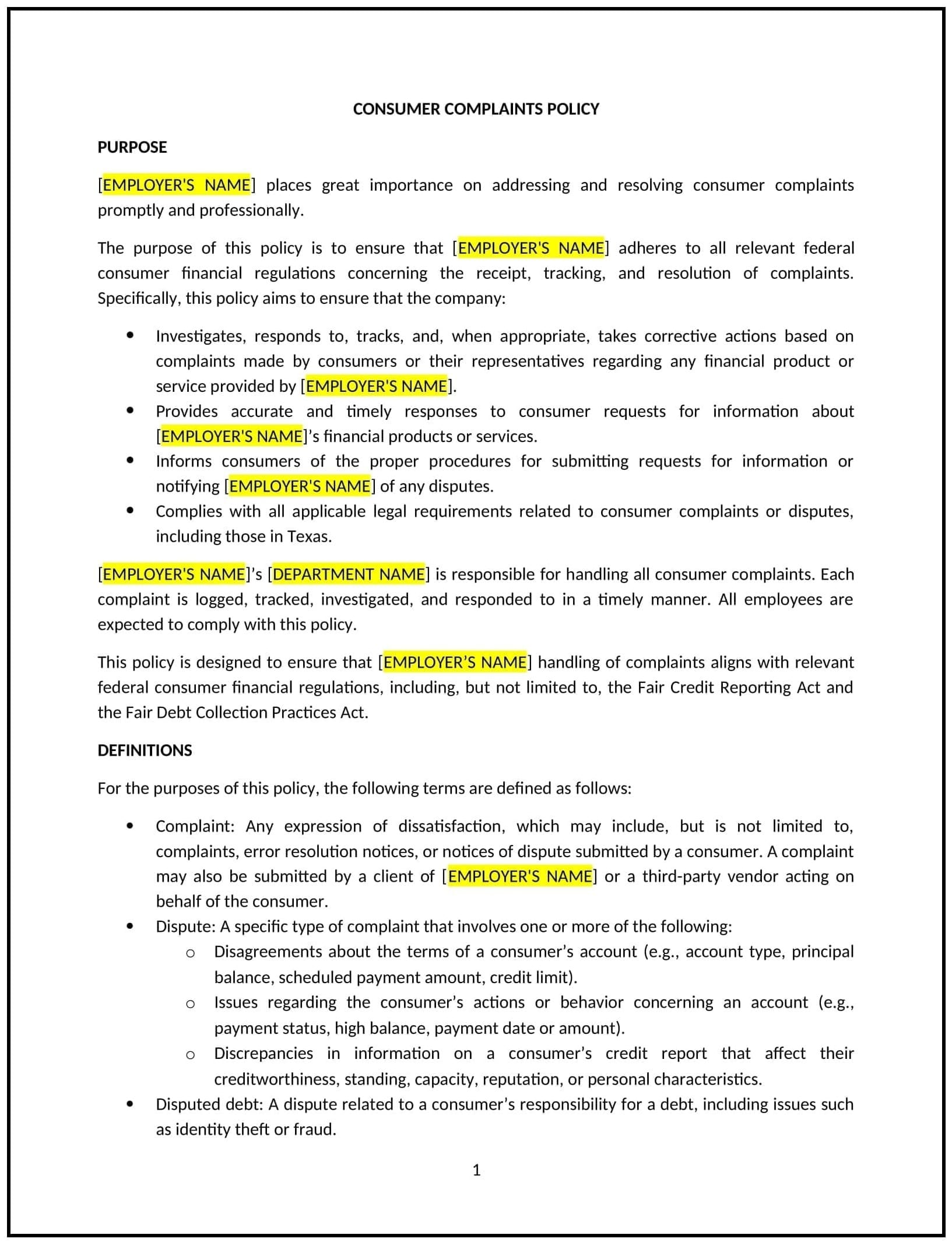Got contracts to review? While you're here for policies, let Cobrief make contract review effortless—start your free review now.

Customize this template for free
Consumer complaints policy (Texas)
This consumer complaints policy is designed to help Texas businesses establish clear procedures for handling consumer complaints in a timely, professional, and consistent manner. Whether businesses are managing product or service complaints, or addressing issues related to customer service, this template provides a structured approach to resolving consumer concerns while maintaining a positive reputation.
By adopting this template, businesses can improve customer satisfaction, foster loyalty, and enhance compliance with Texas state laws related to consumer protection.
How to use this consumer complaints policy (Texas)
- Define the scope of complaints: Clearly specify the types of consumer complaints covered under the policy, including product defects, service issues, billing errors, customer service experiences, or other dissatisfaction related to the business’s offerings.
- Set reporting procedures: Outline how consumers should submit complaints, including the contact channels (e.g., email, phone, website forms), the information required (e.g., purchase details, description of the issue), and any timeframes for submitting complaints.
- Establish acknowledgment procedures: Detail the process for acknowledging receipt of a complaint, including how quickly the business will confirm receipt and provide an initial response to the consumer.
- Outline resolution processes: Specify how complaints will be reviewed, investigated, and resolved, including any follow-up actions, corrective measures, or refunds/replacements, and timeframes for resolution.
- Set follow-up and closure procedures: Define how the business will follow up with the consumer once a complaint is resolved, ensuring customer satisfaction and closure of the complaint.
Benefits of using this consumer complaints policy (Texas)
This policy offers several benefits for Texas businesses:
- Enhances customer satisfaction: A clear and consistent process for handling complaints helps resolve consumer issues quickly, improving overall customer satisfaction and trust in the business.
- Improves business reputation: By demonstrating a commitment to addressing consumer concerns, businesses can build a positive reputation for customer service, which can attract new customers and retain existing ones.
- Reduces legal risks: Handling complaints in a transparent and consistent manner helps businesses mitigate the risk of legal action or consumer protection claims.
- Promotes continuous improvement: Consumer complaints often highlight areas for improvement, and a structured complaint process allows businesses to identify patterns and take corrective action.
- Encourages transparency and accountability: A defined process for addressing complaints promotes a culture of openness and accountability, which is valued by both customers and employees.
Tips for using this consumer complaints policy (Texas)
- Communicate clearly: Ensure that all consumers know how to submit complaints and what to expect during the resolution process. Publicize the complaint process through the business’s website, receipts, and customer service materials.
- Act promptly: Address consumer complaints as quickly as possible, aiming to resolve issues within a defined timeframe (e.g., 48 hours for an initial response).
- Investigate thoroughly: Ensure that all complaints are thoroughly reviewed and investigated to determine the cause of the issue and the best resolution.
- Offer resolutions where possible: Aim to resolve complaints with practical solutions, such as refunds, replacements, or other forms of compensation, to restore customer trust.
- Review regularly: Periodically review the policy to ensure it is compliant with Texas consumer protection laws, reflects industry best practices, and aligns with business operations.